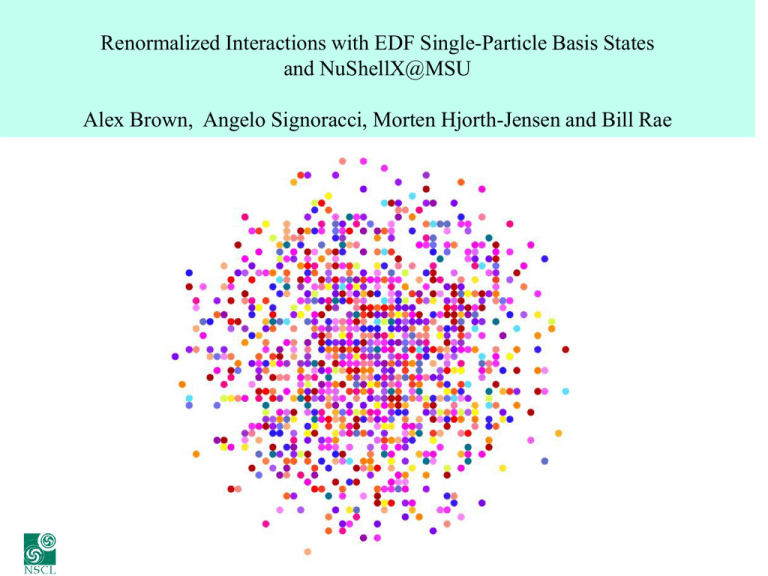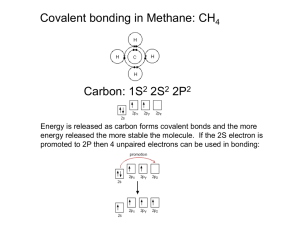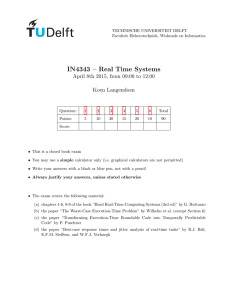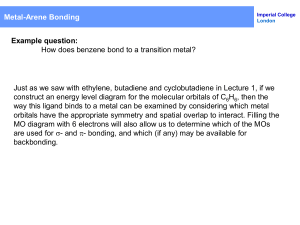Renormalized Interactions with EDF Single
advertisement

Renormalized Interactions with EDF Single-Particle Basis States and NuShellX@MSU Alex Brown, Angelo Signoracci, Morten Hjorth-Jensen and Bill Rae Closed-shell vacuum filled orbitals Closed-shell vacuum filled orbitals Skyrme phenomenology Closed-shell vacuum filled orbitals NN potential with V_lowk Skyrme phenomenology Closed-shell vacuum filled orbitals “tuned” valence two-body matrix elements Skyrme phenomenology Closed-shell vacuum filled orbitals “tuned” valence two-body matrix elements A3 A2 A 1 Typically one uses an harmonic-oscillator basis for the evaluation of the microscopic two-body matrix elements used in shell-model configuration mixing (N3LO + Vlowk+ corepolarization) . Not realistic for the nuclei near the drip line. No three-body interactions. Aspects of evaluating a microscopic two-body Hamiltonian (N3LO + Vlowk+ core-polarization) in a spherical EDF (energydensity functional) basis (i.e. Skyrme HF) 1) TBME (two-body matrix elements): Evaluate N3LO + Vlowk with radial wave functions obtained with EDF. 2) TBME: Evaluate core-polarization with an underlying single-particle spectrum obtained from EDF. 3) TBME: Calculate monopole corrections from EDF that would implicitly include an effective three-body interaction of the valence nucleons with the core. 4) SPE: Use EDF single-particle energies – unless something better is known experimentally. Why use energy-density functionals (EDF)? 1) Parameters are global and can be extended to nuclear matter. 2) Large effort by several groups to improve the understanding and reliability (predictability) of EDF – in particular the UNEDF SciDAC project in the US. 3) This will involve new and extended functionals. 4) With a goal to connect the values of the EDF parameters to the NN and NNN interactions. 5) At this time we have a reasonably good start with some global parameters – for now I will use Skxtb (Skyrme with tensor) [BAB, T. Duguet, T. Otsuka, D. Abe and T. Suzuki, Phys. Rev. C 74, 061303(R) (2006)}. Calculations in a spherical basis with no correlations What do we get out of (spherical) EDF? 1) Binding energy for the closed shell 2) Radial wave functions in a finite-well (expanded in terms of harmonic oscillator). 3) ea = - [BE(A+1,a) – BE(A)] gives single-particle energies for the nucleons constrained to be in orbital (n l j)a where BE(A) is a doubly closed-shell nucleus. 4) M(a,b) = - [BE(A+2,a,b) – BE(A)] - ea - ea gives the monopole two-body matrix element for nucleons constrained to be in orbitals (n l j)a and (n l j)b TBME for the lowest proton (g7/2) and neutron (f7/2) orbitals N3LO – Vlowk (lambda=2.2) TBME for the lowest proton (g7/2) and neutron (f7/2) orbitals N3LO – Vlowk (lambda=2.2) - 4hw TBME for the lowest proton (g7/2) and neutron (f7/2) orbitals N3LO – Vlowk (lambda=2.2) - 4hw TBME for the lowest proton (g7/2) and neutron (f7/2) orbitals N3LO – Vlowk (lambda=2.2) - 4hw 134Sn 134Sb 134Te 136Te What do we get out of (spherical) EDF? 1) ea = - [BE(A+1,a) – BE(A)] gives single-particle energies for the nucleons constrained to be in orbital (n l j)a where BE(A) is a doubly closed-shell nucleus. 2) M(a,b) = -[BE(A+2,a,b) – BE(A)] - ea - ea gives the monopole two-body matrix element for nucleons constrained to be in orbitals (n l j)a and (n l j)b 3) [BE(146Gd) – BE(132Sn)] (MeV) theory: filled g7/2 and d5/2 101.585 experiment 117.232 using ea and M(a,b) from N3LO for all 98.573 Skxtb applied to 146Gd and 132Sn 97.925 using ea and M(a,b) from Skxtb 100.452 Skxtb + 2p-2h from N3LO 134Te 134Sb Experiment Skxtb Experiment 133Sb “adjusted to exp” 134Te 133Sn Experiment Skxtb jj44pn fppn sdpn jj44 means f5/2, p3/2, p1/2, g 9/2 orbits for protons and neutrons Recent results from Angelo Signoracci SDPF-U: Nowacki and Poves, PRC79, 014310 (2009). Energy of first excited 2+ states What is NuShellX@MSU? 1) NuShellX - Nathan-type pn basis CI code implemented by Bill Rae (Garsington). 2) NuShellX@MSU - developments at MSU that includes wrapper code for input, Hamiltonians, output and comparison to data. Three parts: 3) Toi - connection with nuclear data base (175 MB) 4) Ham - connections with the codes of Morten Hjorth-Jensen together with EDF to generate new Hamiltonians. 5) Shell – implementations of NuShellX. 6) Windows version now – linux version being finished maybe someday a Mac version. Toi Nuclear Data *.sp model space files *.int Hamiltonian files Ham Hamiltonian Input programs *.sp *.int library of tuned Hamiltonians *.int files (sps folder) Shell wrapper for NuShellX *.eps Outputs for energies *.lpt <|a+|> *.lsf <|a+ a|> *.obd <|a+ a+|> *.tna postscrip (*.eps) (pdf) figures Shears Bands Energy of first excited 2+ states What might be possible to consider in the spherical CI basis within the next 5-10 years with M-basis dimensions up to 1014 Test case for speed of NuShellX - 48Cr 0+ J-dim=41,355 M-dim=1,963,461 10 eigenstates to 1 keV precision Chip RAM cpu speed GB GHz Intel i7 Quad (8GB) (2.8)x(4) = 11.2 time sec 23 Intel i7 2xQuad (48GB) (3.3)x(8) = 26.4 11 How far can we go - number of cores and speed? Now – transfer from ifort to Portland compilers Next – test replacement of OpenMP with MPI Try out GPU cost $ (1,400) (10,000)





